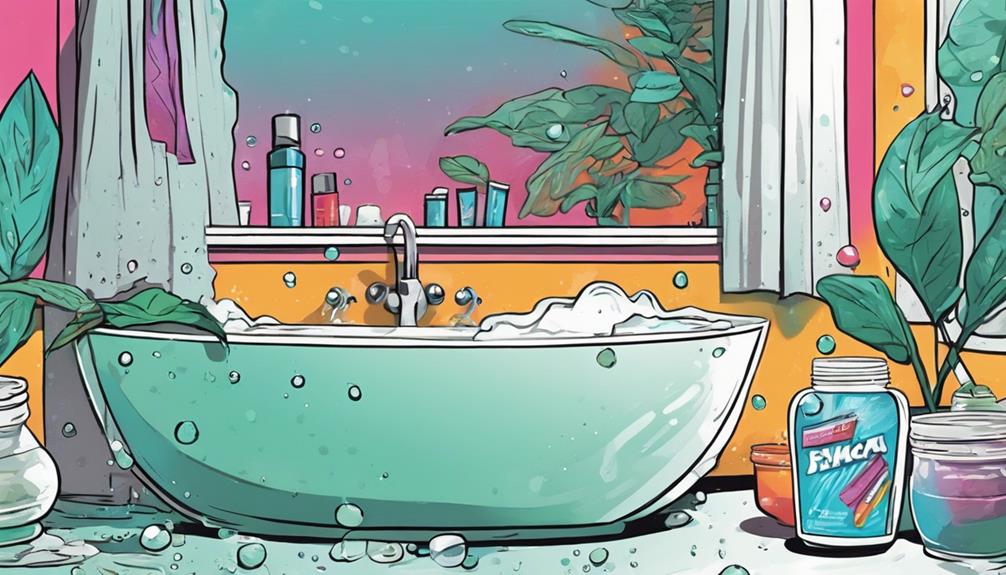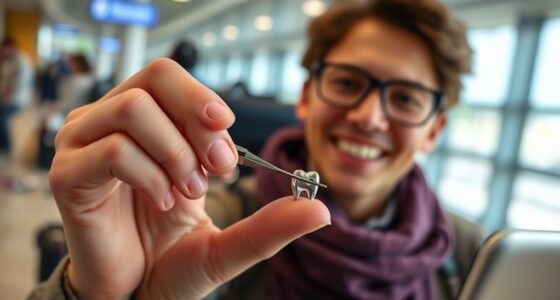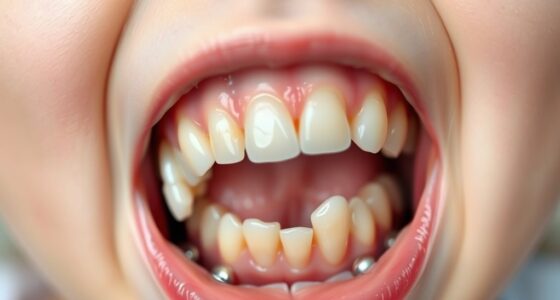You’d be amazed at how a simple toothbrush can transform your routine! Use a soft-bristle toothbrush to gently exfoliate your skin, revealing a smoother complexion. Tame flyaways by applying hairspray to your toothbrush for a polished look. Need more precise makeup application? Brush through clumpy lashes or use it for contouring—it’s a game-changer! You can even promote lip health by exfoliating to keep them soft and supple. This versatile tool will revolutionize your beauty and hygiene practices. Want to discover more ways to elevate your everyday routine? Just wait; there’s plenty more to uncover!
Key Takeaways
- Use a soft-bristle toothbrush to exfoliate skin, revealing a smoother texture and boosting product absorption for a radiant complexion.
- Achieve precise makeup application by using the toothbrush for contouring and defining eyebrows, enhancing your overall look effortlessly.
- Brush through clumpy eyelashes with a clean toothbrush for a natural, wispy effect, elevating your eye makeup routine.
- Tame baby hairs and flyaways by applying hairspray to a toothbrush, ensuring a polished hairstyle on the go.
Transform Your Beauty Routine
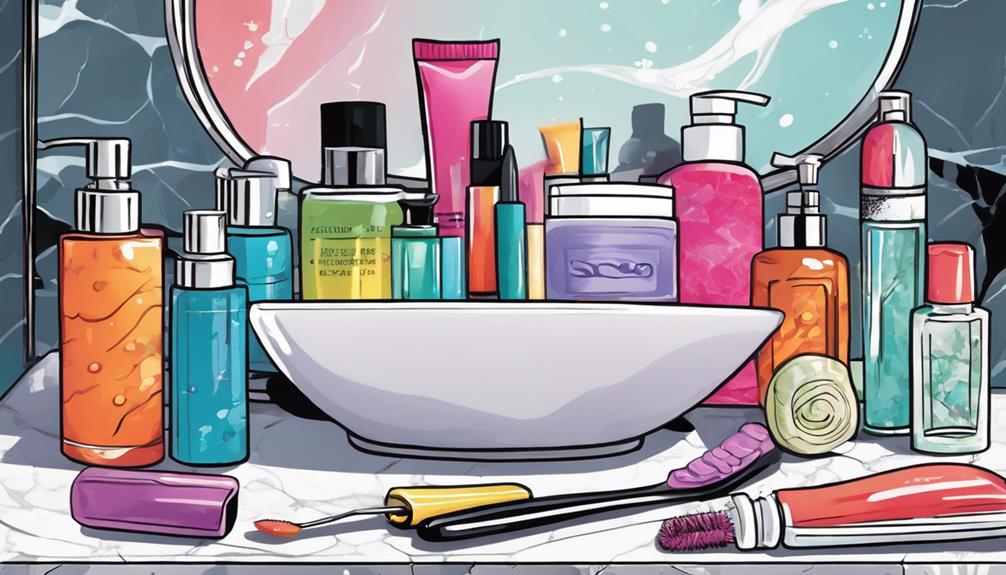
Transform your beauty routine by incorporating a soft-bristle toothbrush to exfoliate your skin and enhance your makeup application. This simple tool can make a significant difference in how your skin looks and feels. By using a soft-bristled toothbrush in combination with your favorite moisturizer, you can gently remove dead skin cells. Just make circular motions across your face, and you’ll reveal a smoother, more radiant surface ready for makeup.
But the benefits don’t stop there. This versatile brush can also help you achieve precise nose contouring. The edge of the soft-bristled toothbrush allows you to create defined lines, which you can easily blend with your fingers for a flawless finish.
When it comes to lip care, gently brushing your lips with the same toothbrush promotes blood circulation, enhancing their natural color and providing a smooth base for lipstick application.
Plus, if you’ve got pesky baby hairs, a soft-bristled toothbrush can tame them effortlessly. Just apply a little hairspray to the brush, and you’ll have a polished look in no time.
Embrace this toothbrush hack, and watch your beauty routine transform!
Exfoliate Your Skin

If you want smoother skin, using a soft-bristle toothbrush can be a game changer.
Gently exfoliating with it not only boosts the smoothness of your makeup application but also prepares your skin to absorb products better.
Incorporating this simple method into your routine can greatly enhance your overall skin health.
Gentle Skin Exfoliation Method
Gently exfoliating your skin with a soft bristle toothbrush can reveal a smoother, brighter complexion by effectively removing dead skin cells. This method not only enhances your skin’s appearance but also ties into your oral hygiene routine. You can focus on areas like your cheeks, jawline, and forehead, where dead skin tends to accumulate.
To maximize results, apply your favorite moisturizer in circular motions while using the toothbrush. This combination helps to nourish your skin and improve its texture. Afterward, wipe away any residue with a makeup remover wipe, preparing your skin for a fresh start.
Here’s a quick reference table to guide you through the process:
| Step | Action |
|---|---|
| 1. Choose a Toothbrush | Select a soft bristle toothbrush |
| 2. Apply Moisturizer | Use in circular motions |
| 3. Exfoliate | Gently brush target areas |
| 4. Clean Up | Wipe with a makeup remover wipe |
Regularly practicing this gentle exfoliation technique can enhance your skin’s health and overall texture, giving you a radiant glow.
Boosts Makeup Application Smoothness
Exfoliating your skin with a soft bristle toothbrush creates a smooth canvas that enhances the application and longevity of your makeup. This simple oral hygiene tool can work wonders when used correctly, allowing your makeup to glide on effortlessly and last throughout the day.
Here’s how it boosts your makeup application:
- Removes Dead Skin Cells: The toothbrush gently exfoliates, getting rid of any flaky skin that could interfere with makeup application.
- Promotes Blood Circulation: The circular motions stimulate blood flow, leading to a healthier and more radiant complexion.
- Prepares Your Skin: By creating a smoother texture, your skin is primed for an even finish, making your foundation look flawless.
- Enhances Makeup Longevity: Regular exfoliation helps products adhere better, so you won’t have to worry about touch-ups throughout the day.
Incorporating this toothbrush technique into your daily skincare routine is quick and cost-effective.
You’ll not only notice a difference in your skin’s texture but also in how your makeup looks and feels.
Prepares Skin for Products
Preparing your skin with a soft bristle toothbrush not only removes dead cells but also enhances the absorption of your favorite products. By using gentle circular motions, you can effectively exfoliate your skin, promoting a smoother and more radiant complexion. This simple technique boosts blood circulation, leading to healthier skin and a natural glow.
| Benefits of Exfoliation | How to Exfoliate |
|---|---|
| Removes dead skin cells | Use a soft bristle toothbrush |
| Enhances product absorption | Apply in circular motions |
| Prevents clogged pores | Focus on problem areas |
| Improves skin texture | Rinse and moisturize afterward |
Incorporating this method into your skincare routine can greatly improve your overall skin texture. You’ll notice visibly softer skin, which makes it an effective and affordable addition to your beauty regimen. Regular exfoliation not only prepares your skin for better application of moisturizers and makeup but also reduces the likelihood of breakouts. So grab your toothbrush and start exfoliating today; your skin will thank you!
Tame Baby Hairs
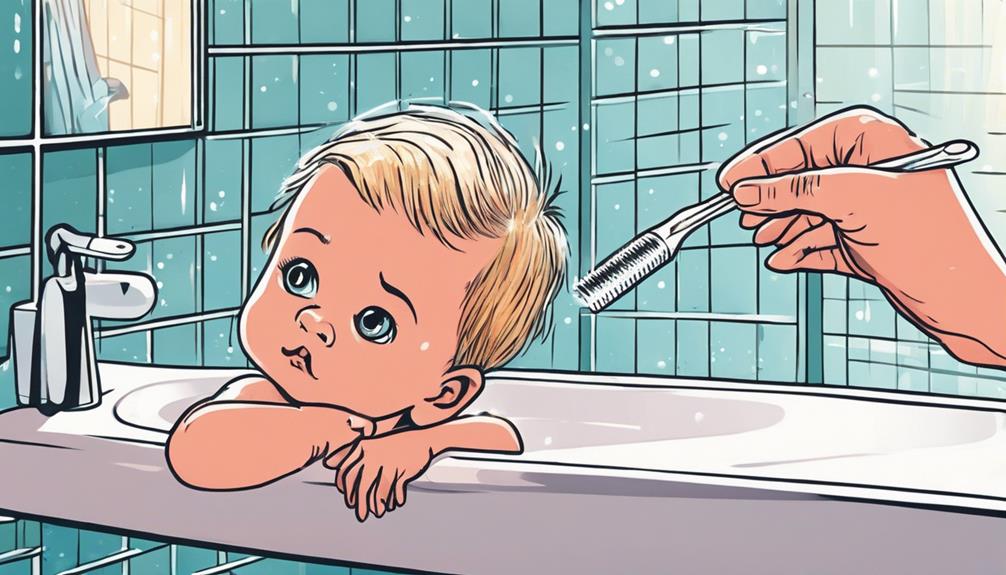
If you’ve got pesky baby hairs that refuse to stay in place, a toothbrush can be your secret weapon.
With just a quick touch-up, you can smooth those flyaways and even define your eyebrow shape.
This handy tool makes styling on-the-go a breeze, ensuring you always look polished.
Quick Touch-Up Solution
Using a toothbrush to apply hairspray is a quick and effective way to tame those pesky baby hairs for a polished look. This toothbrush hack is perfect for anyone looking for a fast touch-up solution while on the go.
Here’s how to do it:
- Choose Your Hairspray: Pick a light-hold hairspray to avoid stiffness.
- Prep Your Toothbrush: Spray a small amount of hairspray directly onto the bristles of your toothbrush.
- Smooth Baby Hairs: Gently brush the toothbrush over the baby hairs, smoothing them down in the desired direction. The soft bristles distribute the product evenly without causing damage.
- Check the Look: Step back and assess your style. If needed, apply a bit more hairspray and repeat the process.
This simple technique not only helps you achieve a neat finish but also enhances your overall grooming.
Whether you’re heading to work or out for a night, this quick touch-up solution makes all the difference. So, keep a toothbrush handy for those moments when you need to look your best!
Define Eyebrow Shape
A clean toothbrush is your secret weapon for defining eyebrow shape and taming those stubborn baby hairs. You can easily brush your teeth, then grab that soft-bristled brush to sculpt your brows. Start by lightly applying your favorite eyebrow product.
| Step | Action |
|---|---|
| 1. Apply Product | Use brow powder or pomade |
| 2. Brush Hairs | Comb through with your toothbrush |
| 3. Set in Place | Spray a little hairspray on the brush |
| 4. Final Touch-Up | Use the toothbrush for any sparse areas |
This technique allows for precise control over your desired arch and fullness. Spraying a bit of hairspray on the toothbrush guarantees that those unruly hairs stay put all day long. Plus, the bristles help evenly distribute the product, giving you a polished look without harsh lines. Whether you’re at home or on the go, this quick method for defining your eyebrows and taming baby hairs is a game changer that fits seamlessly into your routine. So, next time you brush your teeth, remember to grab that toothbrush for your brows!
Separate Clumpy Eyelashes

Gently comb through clumpy eyelashes with a clean toothbrush to achieve a beautifully defined look. This one thing can transform your eye makeup routine, eliminating the dreaded ‘spider leg’ effect. Here’s how to do it effectively:
- Choose a clean toothbrush: Make sure it’s free from any residual product. Hygiene is key!
- Apply your mascara: Coat your lashes as you normally would, but don’t worry if they start to clump.
- Lightly brush through your lashes: Using the toothbrush, start from the base of your lashes and move to the tips. This will separate and define them.
- Redistribute mascara: The toothbrush helps to evenly coat each lash, ensuring a wispy, natural look.
This technique is quick and easy, making it a perfect touch-up option for busy individuals. Plus, it enhances your overall eye makeup without much effort.
Just remember to clean your toothbrush regularly to maintain its effectiveness. With this simple hack, you can say goodbye to clumpy eyelashes and hello to a more polished appearance!
Enhance Lip Care

Exfoliating your lips with a toothbrush can boost blood circulation, giving them a plumper, more vibrant appearance. This simple trick not only enhances your lip color but also helps maintain the health of your teeth and gums.
By using a soft-bristled toothbrush, you can gently brush your lips, removing dead skin cells and promoting a smoother texture. This is particularly beneficial when applying lipstick, as it creates a soft base that allows for an even and long-lasting finish.
Regularly incorporating this lip care hack into your routine can help prevent dry, chapped lips, keeping them moisturized and soft. As you brush, you’ll notice the difference in how your lips look and feel. Plus, the added blood circulation can give your lips a natural, rosy hue.
Don’t forget to be gentle; your lips are sensitive. Just a minute or two of brushing can greatly improve their condition. So grab your toothbrush, and add this quick step to your daily hygiene routine. Your lips will thank you for it, and you’ll enjoy a boost in overall lip health!
Create Hair Volume
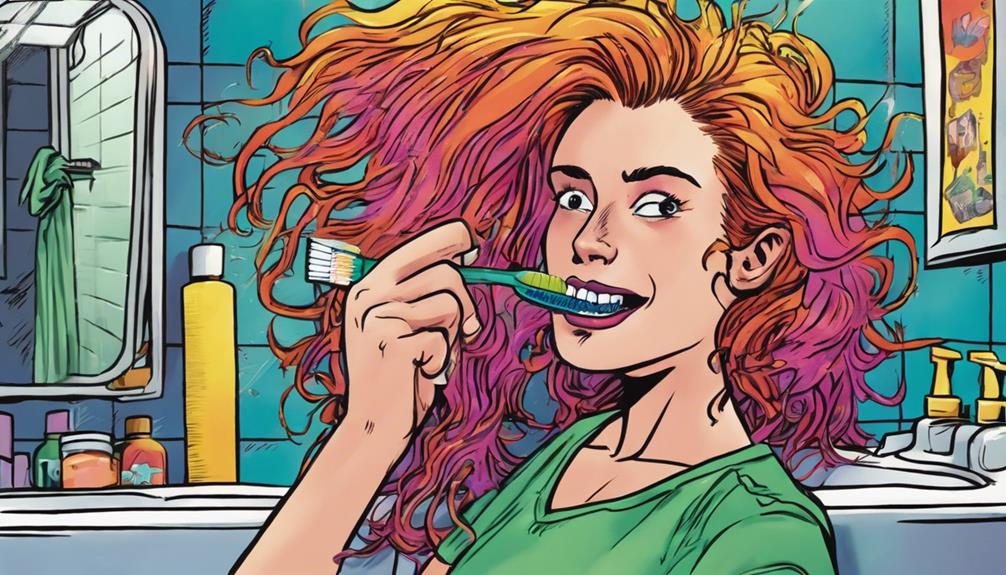
Wondering how to add instant volume to your hair? You’re in luck! Using a toothbrush can transform flat hair into a luscious, voluminous style in no time. This method not only provides lift but also keeps your hair healthy by avoiding excessive teasing. Here’s how to do it:
- Choose the Right Toothbrush: Grab a clean, soft-bristled toothbrush for the best results. Make sure it’s not too stiff, as you want to avoid damaging your hair.
- Lift the Roots: Section off your hair and gently backcomb at the roots using the toothbrush. This adds significant volume without the roughness of traditional teasing brushes.
- Target Specific Areas: Use the precision of the toothbrush to focus on areas that need extra lift. Make sure to distribute the volume evenly for a polished look.
- Finish with Hair Spray: To hold the volume in place, lightly mist your hair with hairspray. This will guarantee your style lasts throughout the day.
With this simple toothbrush hack, you’ll create stunning hair volume that’s perfect for any occasion!
Contour With Precision
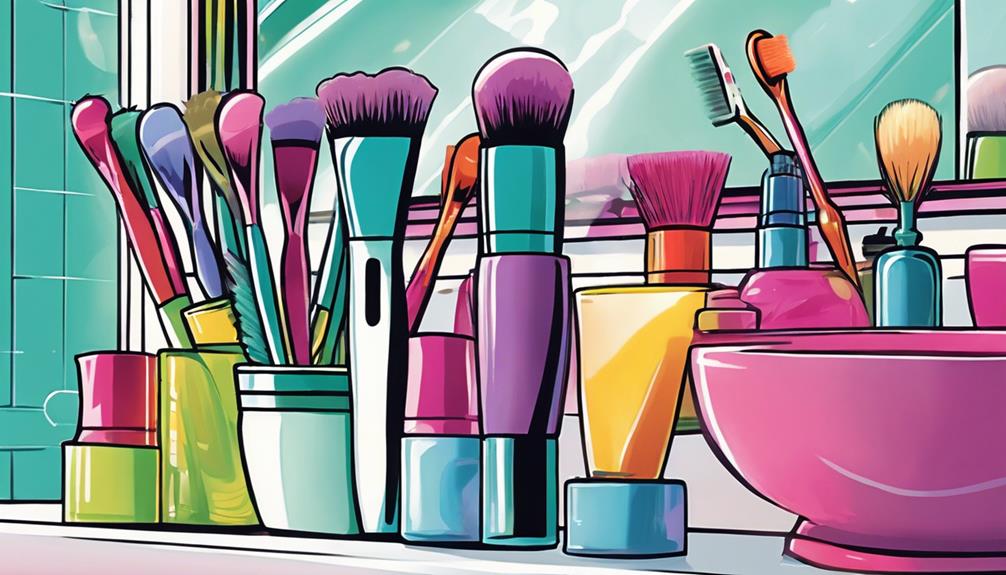
Using a clean toothbrush can enhance your contouring technique, allowing you to achieve precise and defined features effortlessly. To contour your nose, simply use the edge of a soft-bristled toothbrush to apply contour product along the sides and tip. This method gives you better control, making it easier to create those sculpted lines you desire.
After applying the contour, blend it into your skin with your fingers for a seamless finish. This will help you attain a natural look, avoiding any harsh lines that can come from traditional contouring methods. The gentle bristles of the toothbrush guarantee you don’t irritate your sensitive skin, making this hack suitable for everyone.
Incorporating this toothbrush technique into your makeup routine can elevate your contouring skills to new heights, giving you that professional and polished look. Trust me, once you try this hack, you’ll wonder how you ever contoured without it!
For more beauty tips and tricks, follow me on Instagram. I love sharing innovative hacks that can transform your makeup game. So grab your toothbrush and start contouring with precision today!
Style Your Braids

Transform your braids into stunning styles with a simple toothbrush hack that adds volume and definition. You can elevate your braid game effortlessly with just a clean toothbrush. Here’s how:
- Tease for Texture: Gently tease sections of your braid with the toothbrush bristles. This adds fullness and a textured look that makes your braids pop.
- Define Strands: Use the toothbrush to separate and define individual strands. This technique gives your braid a polished, sophisticated finish that stands out.
- Achieve a Bohemian Vibe: For a relaxed, boho look, lightly backcomb the braid. The toothbrush’s bristles create a tousled effect, perfect for casual outings.
- Control Your Style: Incorporating a toothbrush into your styling routine gives you precise control over texture. You can easily achieve your desired look without needing extra products.
This simple toothbrush hack can transform standard braids into eye-catching hairstyles, suitable for both casual and formal occasions.
Embrace this easy method, and watch your braids become the center of attention!
Boost Your Oral Hygiene
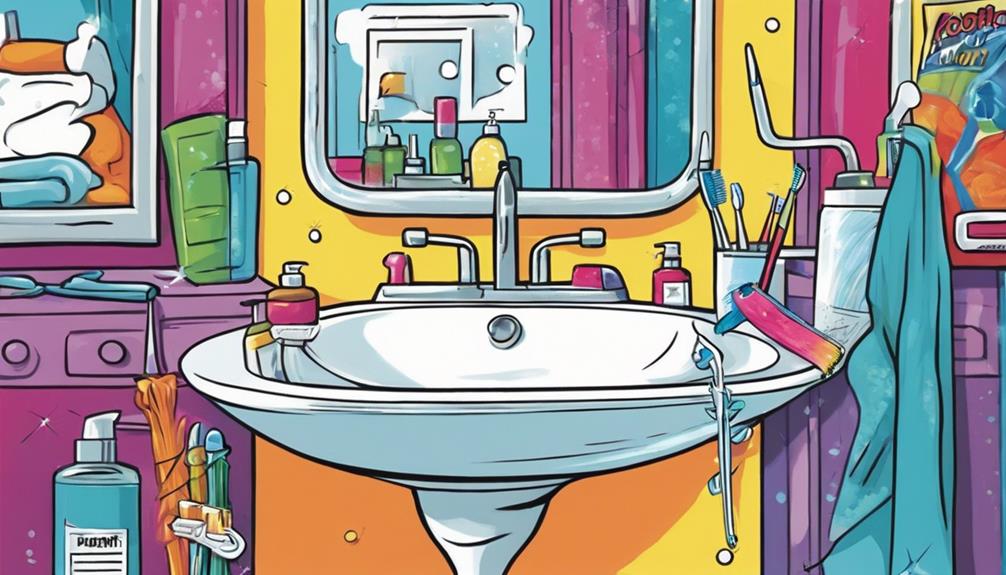
While styling your braids can enhance your look, maintaining excellent oral hygiene is equally important for your overall health and confidence.
Start with a soft-bristled toothbrush, as it effectively removes plaque and food particles, reducing your risk of cavities and gum disease. Spend at least two minutes brushing your teeth twice a day to guarantee thorough cleaning.
Consider upgrading to an electric toothbrush, which can remove up to 100% more plaque than a manual brush. This upgrade can result in markedly better dental health outcomes.
Don’t forget your tongue; using your toothbrush to clean it can decrease bad breath and improve your oral health.
It’s essential to replace your toothbrush every three months to maintain peak cleaning effectiveness; old bristles can harbor bacteria.
Finally, take a moment to gently exfoliate your lips with your toothbrush. This practice promotes blood circulation, giving your lips a healthier, more vibrant appearance.
Frequently Asked Questions
What Toothbrush Cleans Teeth in 30 Seconds?
The Colgate Hum smart electric toothbrush cleans your teeth in just 30 seconds with sonic vibrations. Its built-in timer guarantees you brush effectively, helping you maintain better oral health and reduce the risk of cavities.
What New Toothbrush Cleans in 10 Seconds?
Imagine a whirlwind of cleanliness! The new Sonicare DiamondClean Smart toothbrush cleans your teeth in just 10 seconds with its sonic technology. You’ll achieve a dazzling smile while effortlessly enhancing your oral hygiene routine every day.
Does Using Your Finger as a Toothbrush Work?
Using your finger as a toothbrush can help dislodge some particles, but it won’t effectively remove plaque or stimulate gums. For ideal dental health, stick to a proper toothbrush and fluoride toothpaste.
How to Clean Teeth Without Toothbrush or Toothpaste?
Ever wondered how to clean your teeth without a toothbrush? You can chew sugar-free gum, munch on crunchy fruits, or rinse with baking soda. Even a clean cloth or diluted hydrogen peroxide works wonders!
How Can the One Toothbrush Hack Improve My Teeth-Brushing Technique?
The one toothbrush hack can significantly improve your teeth-brushing technique. By paying attention to the 5 signs of improper brushing – such as bleeding gums or bad breath – you can adjust your technique for a more effective clean. This simple hack can lead to better oral health and a brighter smile.
Can Chewing Gum Replace the Toothbrush Hack for Dental Care?
Many people wonder about the benefits of chewing gum for dental care. While chewing gum can help freshen breath and remove food particles, it cannot replace the need for regular toothbrushing. Chewing gum should be seen as a supplement to, not a replacement for, proper dental hygiene.
Conclusion
Incorporating this simple toothbrush hack into your routine is like discovering a hidden key to access your beauty potential. By using this toothbrush hack, you can effectively remove more plaque and prevent staining, resulting in a brighter, healthier smile. It’s a small change that can make a big impact on your overall appearance and confidence. And don’t forget to maintain good toothbrush hygiene habits, such as rinsing your toothbrush thoroughly after each use and replacing it every 3-4 months, to keep your oral care routine at its best.
Just as a small brush can wield great power over your hair and skin, you too hold the power to transform your daily habits.
Embrace this tool as a symbol of your ability to enhance not just your appearance, but your confidence.
Remember, it's the little things that can make a big difference, so let this be your secret to shining brighter.
